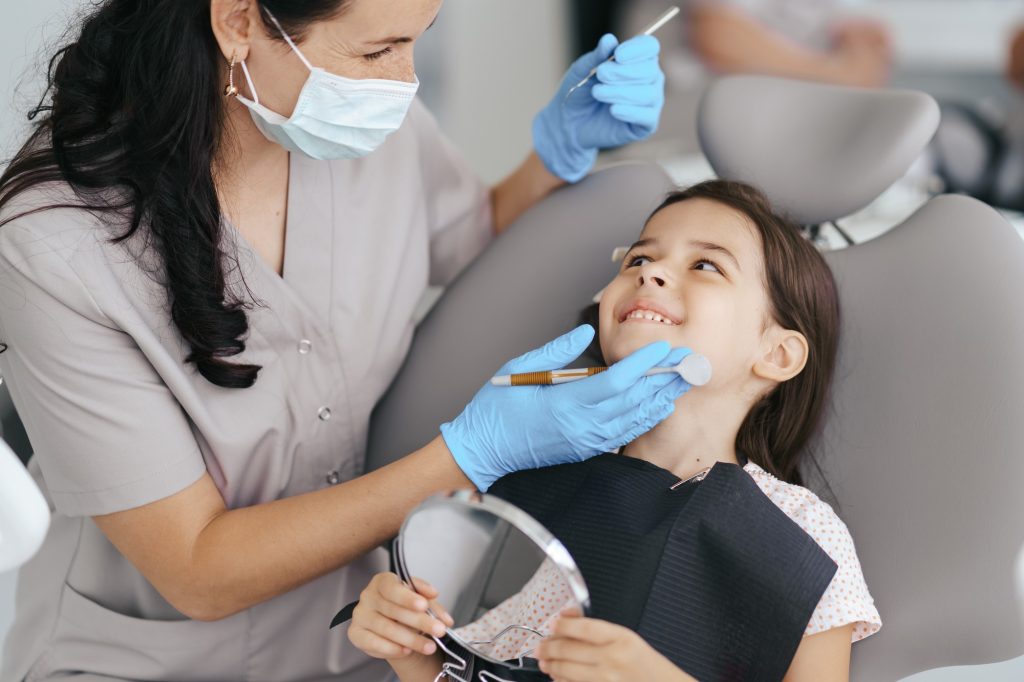
Children, who are particularly prone to tooth decay, should brush their teeth twice a day and make regular visits to a pediatric dentist. These healthy habits can help reduce the risks of developing cavities and serious dental issues. Using fluoride toothpaste is also an important step in childhood dental care that can add an extra dose of much-needed protection.
The importance of fluoride for oral health
Fluoride is a naturally occurring mineral that can be found in a variety of substances, including:
- Rocks
- Plants
- Soil
- Water
Research has shown that this mineral can help prevent tooth decay by building and strengthening the enamel on teeth. For this reason, it is often added to municipal water supplies and many kinds of toothpaste. Because permanent teeth are still being developed until the late teenage years, it is especially important that children receive enough fluoride to grow stronger, healthier teeth.
Enamel is a tooth’s primary defense against cavities. This hard, protective coating helps prevent bacteria from making its way inside. However, enamel can become weakened from acid erosion, excess sugar consumption, or aggressive brushing. Fluoride can help remineralize teeth and restrengthen weak enamel at any age, preventing decay and infection.
Guidelines for fluoride toothpaste
The American Dental Association recommends that children and adults of all ages use fluoride toothpaste on a daily basis. However, the amount used per brushing session varies by age.
Babies and toddlers
In the past, some dentists suggested waiting to use fluoride toothpaste until a child was able to brush without swallowing. However, it is perfectly safe and even recommended to consume fluoride in small, controlled amounts. The anti-cavity properties of fluoride make it especially beneficial for babies and toddlers, who can be more prone to tooth decay because of high levels of milk consumption and the use of bottles and pacifiers.
A pediatric dentist will likely recommend that toothbrushing with fluoride toothpaste begin as soon as the first baby teeth erupt. However, only a minimal amount is needed to clean such a small number of tiny teeth. The toothpaste used should measure no more than the size of a single grain of rice.
Young children
Once children reach the age of 3, they have usually developed a better sense of control over the swallowing reflex. When a young child is able to brush without swallowing, parents should increase the amount of fluoride toothpaste to a pea-sized drop. This is the maximum amount that should be used by both children and adults; any more is unnecessary.
It is important for parents to supervise the entire brushing process to help children learn good habits and proper technique. This helps ensure a more thorough clean while preventing excessive toothpaste use. Too much fluoride can actually be problematic and may lead to weakened teeth enamel or fluorosis, a whitened discoloration of the teeth.
Conclusion
Fluoride toothpaste is beneficial for oral health. Children should use it in the right amounts to build and strengthen tooth enamel for better protection against cavities. While fluoride toothpaste is recommended for all ages, parents should always talk with a pediatric dentist about the right products, treatments, and home care techniques for their child’s specific needs.
Request an appointment here: https://novapedsdentistry.com or call Nova Pediatric Dentistry at (201) 812-2952 for an appointment in our Dumont office.
Check out what others are saying about our dental services on Yelp: Pediatric Dentist in Dumont, NJ.
